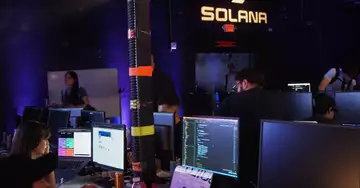Solana suffered its latest outage on Wednesday, which lasted more than four hours because the blockchain was processing a niche type of transaction designed for offline use cases.
Validators began restarting the network after disabling these so-called "persistent nonce transactions," Austin Federa, communications director for Solana Labs, told CoinDesk. They will remain locked until developers identify and patch the exact culprit that threw Solana's consensus mechanism out of whack.
That may impact any offline repositories whose transactions fall into that category, and perhaps even freeze the ability to move funds until the patch is applied, investigators said. CoinDesk has begun contacting exchanges to learn about their Solana transaction setups.
However, as of press time on Wednesday, several exchanges were reporting problems with Solana deposits and withdrawals. Among them: Binance, Coinbase and Crypto.com.
The chain's native SOL token was already trading lower Wednesday when the outage began around noon; it continued its 24-hour slide to $39.98 at 8:30 p.m. ET, according to CoinMarketCap.
Durable Nonces
Federa said durable nonces accounted for an "incredibly small percentage" of transactions on Solana until recently. The technology is becoming increasingly popular with exchanges. In cryptography, a nonce is a random number used for a specific purpose.
"This was probably a bug that existed for a while but never really became a problem because it's not something most people use," Federa said.
Permanent nonces on Solana are meant for token holders with complex offline signature setups that can't always prepare their transactions fast enough for the fast network.
For example, a custodian signing Solana transactions with two detached computers might not be able to complete the task within a single block. Normal transactions on Solana would fail in this scenario. Durable nonces give the token holder time to work.
What happened on Wednesday was a flaw in Solana's ability to handle permanent nonces. Instead of treating these niche inbounds as a single transaction, the network's validators double-counted them as a single transaction on two different block heights, Federa said. This impossible situation brought down Solana's consensus mechanism.
In a tweet, Laine of Stakewiz, an operator of Solana validators, said the bug was "known" and fixed before Wednesday's events. It had "never occurred in this form before," it said.
The network slowly came back to life Wednesday night as key infrastructure pieces such as RPC nodes resumed their work.

